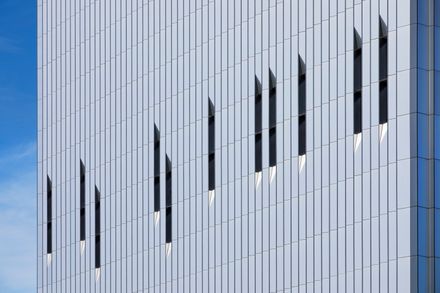
Public Safety Answering Center II
ARCHITECTS
Skidmore, Owings & Merrill
STRUCTURAL ENGINEER
Thornton Tomasetti
SUSTAINABILITY CONSULTANT
Vidaris
CLIENT
New York City Department of Design and Construction
MEP ENGINEER
Jaros Baum & Bolles
SENIOR INTERIOR DESIGNER
Cynthia Mirbach
CIVIL ENGINEER
Philip Habib & Associates
MANUFACTURERS
Island Exterior Fabricators, Terrazzo & Marble, Armstrong Ceilings, Kawneer, Shaw, Sherwin-Williams
LIGHTING DESIGNER
Domingo Gonzalez Associates, Vidaris
GEOTECHNICAL ENGINEER
Langan Engineering & Environmental Services
ACOUSTICAL AND VIBRATION DESIGNER
Shen Milsom & Wilke
LANDSCAPE ARCHITECT
Thomas Balsley Associates, Vidaris
CONSTRUCTION MANAGER
Tishman Construction Corporation
VERTICAL TRANSPORTATION CONSULTANT
an Deusen & Associates
DESIGN PARTNER
Gary Haney
MANAGING PARTNER
Laura Ettelman, Peter Magill
TECHNICAL PARTNER
Carl Galioto
INTERIOR DESIGN PARTNER
Stephen Apking
MANAGING DIRECTOR
Mark Regulinski
TECHNICAL DIRECTOR
Nicholas Holt
PROJECT MANAGER
Emily Mottolese, Mark Leininger, Joseph Sacco
SENIOR DESIGN ARCHITECT
Rob Rothblatt
SENIOR TECHNICAL COORDINATOR
Carl Brown
SENIOR TECHNICAL ARCHITECT
Lesley Campbell, Ross Goldsworthy
ACTIVE MODULAR PHYTOREMEDIATION WALL SYSTEM (AMPS)
Center for Architecture Science & Ecology
SUSTAINABILITY CONSULTANT LANDSCAPE ARCHITECT GRAPHIC DESIGNER LIGHTING DESIGNER
Vidaris
CODE CONSULTANT
Milrose Consultants
COST ESTIMATING CONSULTANT
Ellana Inc
KITCHEN CONSULTANT
Hopkins Food Service
GRAPHIC DESIGNER
Lebowitz Gould Design, Vidaris
SECURITY DESIGN CONSULTANT
Shen Milsom & Wilke
YEAR
2016
LOCATION
Bronx, United States
CATEGORY
Emergency Services Facility
Text description provided by architect.
Public Safety Answering Center II (PSAC II), a new facility located in the Bronx, enhances New York City’s 911 emergency response system and sets a high standard to sustainability.
The 450,000-square-foot building brings together emergency response workers from multiple city agencies—the Police Department, the Fire Department, and Emergency Medical Services—serving as a model for inter- agency cooperation.
As a back-up facility to the city’s primary call center, PSAC II introduces an important layer of redundancy to New York City’s 911 system.
Continuously operating and highly secure, the building enhances the city’s ability to maintain communication in the event of a natural disaster or large-scale emergency.
The project’s completion is a milestone in New York City’s overhaul of its 911 system, a long-term initiative begun by former Mayor Michael R. Bloomberg.
PSAC II sits on a prominent nine-acre site at the intersection of Bronx and Pelham Parkway and Hutchinson River Parkway.
With its design, SOM confronted the challenge of creating a secure and functional building that also makes a positive contribution to its urban context. Designed as a perfect cube, the structure has few windows due to security concerns.
To mitigate the building’s potentially monolithic appearance, SOM developed a dynamic, serrated facade that includes recycled aluminum.
The building is surrounded by a wrap-around sculptural berm of wild grasses. This berm serves as a barrier to protect the facility, and it also enriches the aesthetics of the site.
From the Hutchinson River and Pelham Parkways, the berm hides the surface parking and loading dock from view; for the building’s occupants, it o ers a sense of connection to nature.
The landscape requires no irrigation, which helps to achieve the project’s ambitious sustainability goal of LEED® Gold certification.
SOM gave special attention to creating a soothing environment for the emergency response teams working inside. The building’s main gathering space features an innovative plant wall developed by CASE, the design research laboratory of SOM in partnership with Rensselaer Polytechnic Institute.
This plant wall not only introduces nature into the building, but also lters the air and reduces overall energy use.






















